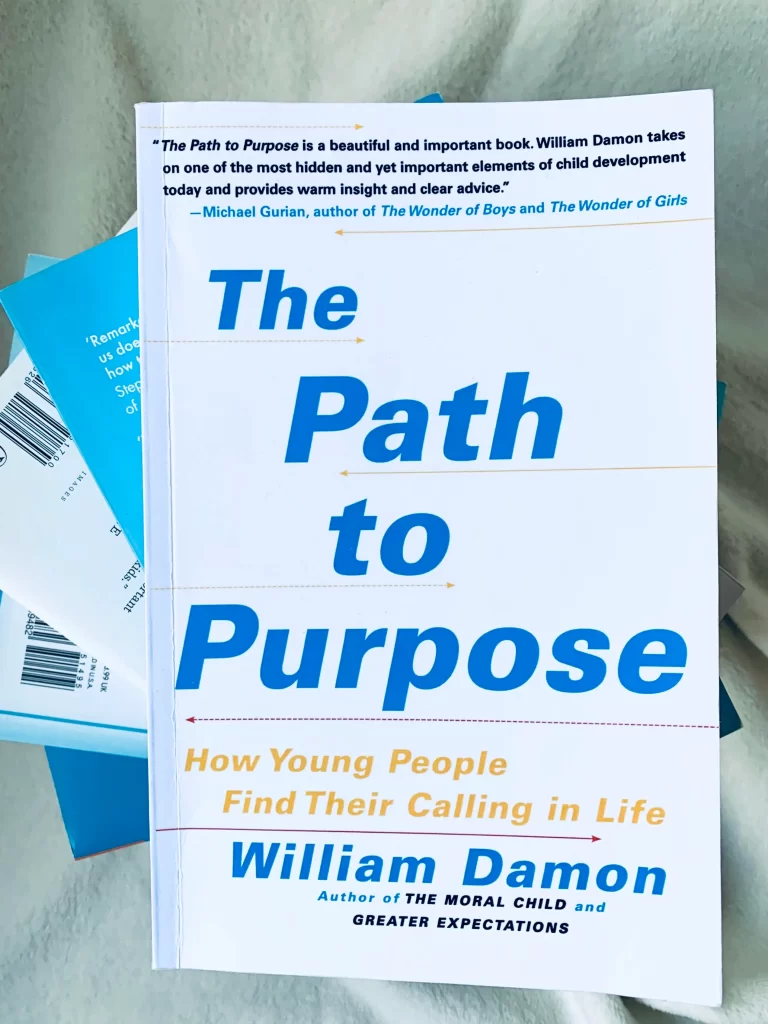 The Path to Purpose – book summary
The Path to Purpose – book summary
How Young People Find Their Calling in Life
William Damon
Free Press; Reprint edition (7 April 2009)
About the author:
William Damon is one of the world’s leading scholars of human development. He is a professor at Stanford University, director of the Stanford Center on Adolescence, and senior fellow at Stanford University’s Hoover Institution. Damon has done pioneering research on the development of purpose in life. His research is covered regularly in the news, and he frequently appears on TV, radio, and the public-speaking circuit.
About the book:
This book is a must-read for every parent. Here, William Damon shares his research results and investigates one of the most significant issues of many young people – purposelessness. He presents simple but powerful methods that parents can use to help children cultivate “that energized sense of purpose” so they could have a happy and productive life.
Key Ideas from the book:
“My studies – and this book – have a purpose of their own: make a case for the primary importance of purpose in youth development. I hope to make this case for all those who take an interest in the young, whether as parents, educators, scientists, professionals in the field of youth development, or citizens in the society that today’s young will someday inherit.”
In this book, Damon highlights one of the key issues of young people – lack of meaningful purpose in life. According to the author’s study, the majority of young people nowadays experience “a sense of emptiness”, which causes a significant level of apathy, anxiety and depression. And instead of spending their lives making progress in fulfilling their dreams, they are stuck in frustration and face a crisis later in life.
The theme of “purpose” is HUGE in positive psychology. In fact, it is a secret ingredient of a happy life. So in this book Damon shares his great insights on how we can help our children find their purpose so that they could have truly amazing and fulfilling lives. Let’s dive in.
Purpose is crucial for thriving in life
“…a good deal of work in psychology has revealed that there is a powerful link between the pursuit of a positive purpose and life satisfaction.”
A strong sense of purpose is closely connected to all well-being dimensions (including health, mental performance, resilience, personal growth, social competence, a sense of command over one’s life, and a positive self-image).
To achieve great things in life, we need to know “WHERE we are going”, and WHY we want to get there, so we will not be distracted by other million options on our way.
So established life purpose is actually “a source of motivation” to wake up every morning and strive to do the best towards our (internal) life goal. That’s our “WHY?”:
“A purpose is an ultimate concern. It is the final answer to the question Why? Why are you doing this? Why does it matter to you? Why is it important? A purpose is a deeper reason for the immediate goals and motives that drive most daily behaviour.”
A sense of purpose requires three things: “(1) a realistic awareness of one’s own abilities; (2) an interest in how those abilities can serve some aspect of the world’s needs; and (3) a feeling of enjoyment in using one’s abilities in this way.”
And yes – purpose should be at the same time meaningful to the self and “consequential for the world beyond the self.” And it has to be noble – positive and pro-social.
Here comes to mind Nathaniel Branden and his great book The Six Pillars of Self-Esteem (check out the notes). Remember the 5th pillar of Self-esteem – the practice of living purposefully? So life purpose energizes our existence. And it is essential for healthy self-esteem, and therefore for our happiness and life satisfaction.
Damon also makes a strong point – often, parents put too much pressure on their children regarding their future life choices. Obviously, parents want the best for their kids and often get too pushy with what is the best career path to pursue to succeed in life. Also, here comes the point that culturally most of us were raised to depend on parents’ opinion (elders). Often they expected us to follow their well-meant advice without much questioning. And the problem here, that when we have our own kids, we tend to follow the autopilot installed in our childhood.
But by telling our children what to do in life and imposing our unfulfilled dreams on them, we do more harm than good. It actually damages kids’ ability to develop and pursue their OWN purpose. That leads to negative consequences as feeling stressed, “trapped and anxious” and depressed.
As parents, our primary job is “to give them roots and wings” – we need to teach them how to find their purpose and make the right choices by themselves.
According to Damon’s research, only 20% of young people are purposeful:
“The purposeful are those who have found something meaningful to dedicate themselves to, who have sustained this interest over a period of time, and who express a clear sense of what they are trying to accomplish in the world and why. They have found a cause or ultimate goal that inspires their efforts from day to day and helps them fashion a coherent future agenda. They know what they want to accomplish and why, and they have taken concerted steps to achieve their ambitions.”
The rest of the young people he allocated to the following categories:
1) “Disengaged” (about 25% of young people) – those who have no purpose, apathetic and detached, and show little concern for the world beyond the self.
2) “The dreamers” (25%)– who have some aspirations and express ideas about purposes but do little (or nothing) actively to explore any of these ideas.
3) “The dabblers” (31%) – those who have engaged in various purposeful activities, but could not find the meaning of these activities beyond the present (and failed to stay committed to any of them for a long time).
Question for you – what category are you falling in? What is your noble purpose?
P.S.: We would highly recommend Julie Lythcott-Haims’ brilliant book How to Raise an Adult where she talks about the consequences of overprinting (or helicopter parenting) – check out our notes.
Culture of short horizons – the main obstacle on the path to purpose
“The single greatest barrier to youngsters finding their paths to purpose is the fixation on the short horizons that infuses cultural messages sent to young people today. A popular culture celebrating quick results and showy achievements has displaced the traditional values of reflection and contemplation that once stood as the moral north star of human development and education. Instant mass communication transmits tales of highly envied people who have taken shortcuts to fame and fortune to every child with access to computers and televisions (and that amounts to just about every child in any industrial society). Among the most common formats for television shows at present are contests in which ordinary young people rocket to fame or fortune in a matter of minutes, days, or, at most, weeks. The appeal of quick material success is amplified by current economic conditions, which have led to unparalleled abundance and affluence for some, fierce global competitiveness for others, and the specter of deprivation for many others.”
Damon wrote this book before the social media era, but as you can imagine, this problem was huge but even more relevant nowadays. Now we are constantly bombarded with ads about getting rich quickly (and effortlessly). Facebook and Instagram are full of “influencers”, and the whole culture focuses on material success and fame. And that’s the main obstacle on our (and our kids’) way to find the purpose.
One thing we should remember and teach our kids: “Any success in life, from the mundane to the spiritual, requites sustained effort.”
Here comes to mind Angela Duckworth and her bestseller “Grit”, where she shares a simple formula of success:
Talent x Effort= Skill
Skill x Effort= Achievement
So effort counts twice if you aim for success.
The culture of short horizons damages our ability to think wider. Often young people concentrate too much on SELF while thinking about their future work – how much they can earn, possibilities of fame and fortune, whether or not it will incorporate their interests. But they totally forget to think about how they can contribute BEYOND self.
Moreover, Damon makes a point that schools add to the issue. Instead of focusing on developing a love for learning for learning’s sake, teachers and students put considerable effort and most of the time to prepare for tests. He adds:
“If we never provide students with information about what adults they admire find meaningful; if we never tell them about how those adults searched for purpose; if we never give them occasions for reflecting on their own searches and encourage them to ask the essential questions about what they want to do with their lives, we risk raising a generation that enters adulthood without direction – or, worse yet, hesitates to enter adulthood at all.”
Obviously, there is no straightforward solution to this issue. But Damon encourages individuals and institutions to build the culture of noble purpose – basically develop communities based on visible values and with a clear focus on creating positive and productive opportunities for young people.
Discussing the Culture of Purpose, Damon mentions a brilliant idea: we should focus less on what’s wrong with children and concentrate on understanding, educating and engaging children in productive activities. Scientists called it “The positive youth development approach”.
Absolutely love it! And Sir Ken Robinson was a strong advocate of this approach (check out his books and a TED talks for more).
Parenting for purpose – practical guidance
“I am entirely confident in asserting that the urgent project for parents today, in this world of increasing economic, cultural, and social uncertainty, is to help their children gain a wholesome sense of direction that will carry them through the minefields of drift, confusion, apathy, anxiety, fear, and self-absorption that threaten their generation. I am also convinced that the key to this sense of direction is finding a life purpose. While a parent cannot simply give a purpose to a child, and indeed any too forceful or controlling effort to do so is likely to have adverse repercussions, nonetheless there is much that a parent can do.”
Now we know that a clear sense of purpose is key to a happy and fulfilled life. In this part of the book, Damon gives us actionable tips on how we can help our children develop their purpose in life. We would say it’s the most important part of the book for parents ☺
Damon reminds us that family is the first and most important source of purpose for young people. Considering that not many young people show interest in society beyond their family and friends, parents have a big job to do here.
Damon makes a great point: “virtually, all young people need more attention and guidance from their elders than they are currently receiving”.
And here is the first point which all parents should understand: we cannot choose or create a life purpose for our children. That’s not the option. Children need to have a sense that they have the power to choose their way. What we need to do is to lead a child toward discovering “promising options” and then help him sort out the choices and reflect on how he can apply interests and talents in the real world.
Damon shares nine things we can do today to help our kids to cultivate their sense of purpose:
- Listen closely for the spark, then fan the flames. Every child has a “spark” (or few) of interest. We need to listen for them then help fan the flames of potential meaning. So we need to practice ‘the conversational art of asking good questions and listening for answers”. Ask your children what they are interested in (quite simple, isn’t it?).
- Take advantage of regular opportunities to open a dialogue. Here communication is the key – no lecturing, but open conversation (that means that a child speaks 50% of the time ☺). And don’t wait for a special occasion to talk about purpose and interests. Use every “micro-occasion” to ask your child about his opinion about the topic or any other question that would trigger reflection.
- Be open-minded and supportive of the sparks of interest expressed. We can’t choose a purpose or an interest for our children. We need to embrace what fires them up (even if it seems weird for us) and support them in developing these interests (without being pushy). Damon adds: “The child’s interest should be free to take its own course, including dwindling out if that’s what is destined. Parents can never know which grass seeds are going to turn out to take deep root.”
- Convey your own sense of purpose and the meaning you derive from your work. We should lead by example and share with our kids our own goals and a sense of purpose. So let’s talk about the value of our own work, even if the only thing we would like to do is to complain about it (that’s what loads of parents do, unfortunately)
- Impart wisdom about the practicalities in life. Children can’t get real-world knowledge in school, so they rely on parents to help them create a vision of what’s possible and how to turn their dreams into practical action. “Parents must tell children what they know about accomplishing goals in real world, especially the world of work.”
- Introduce children to potential mentors. Once we see the spark of an interest in a child, we can help by introducing him to mentors who can inspire and may be able to support his mission in whatever ways they can.
- Encourage an entrepreneurial attitude. An entrepreneurial spirit is one of the main predictors of success in life. That’s about “I can do it!” attitude and growth mindset ☺ but more on that later.
- Nurture a positive outlook. Optimism and a positive outlook are essential for success. That’s about helping our children build a strong sense of self-confidence and understand how much control they have over the outcome. The best way to teach them is by showing them – again, be an optimism role model.
- Instill in children a feeling of agency linked to responsibility. “Whatever you do in this world matters.” Agency is basically a sense of empowerment and a feeling that you can positively impact the world. And if we mix it with a sense of responsibility, we teach our children that they are “interesting and capable”. One of the best ways to do it is to let them do chores (note: let your child pick chores every week).
So here are questions for you – what do you already do from the list? Which one or two points resonated with you the most – how can you put theory into practice to help your child find purpose in life?
Entrepreneurial spirit and “You can do it!” attitude
“One of the defining features of highly purposeful youth is their entrepreneurial manner of pursuing objectives. For the highly purposeful…, entrepreneurship was a stronger common factor than usual measures of success such as school achievement. Although these youngsters generally did well enough in school, few of them were valedictorians or all-A students; but virtually all were superb entrepreneurs. As a predictor of later success in life, I would place my bet on strong entrepreneurial capacities.”
All the purposeful young people in Damon’s study had an entrepreneurial spirit. And that doesn’t mean that they’ve actually started a business – that’s the general orientation to life (mindset) that promotes every sort of accomplishment.
Obviously, parents play a HUGE role in cultivating entrepreneurial spirit – our main role is to encourage them to get excited about challenges and help to develop “CAN DO!” attitude. That reminds us of Carol Dweck and her Growth Mindset – love challenges, learn from mistakes and never give up ☺
Damon says:
“Cultivating an entrepreneurial spirit means encouraging the following attitudes or dispositions: (1) The ability to set clear goals and make realistic plans to accomplish them; (2) an optimistic, can-do attitude; (3) persistence in the face of obstacles and difficulties; (4) a tolerance—or more, even an appetite—for risk; (5) resilience in the face of failure; (6) determination to achieve measurable results; and (7) resourcefulness and inventiveness in devising the means to achieve those results.”
And of course – if a child decides to start a business, parents should always encourage such activities and provide support.
Damon also makes a strong point that we should encourage children to put effort and try new things (even if they frighten them ☺) with “You can do it!” attitude:
“Encouraging children to make the effort expands their range of learning and increases their motivation to do more.”
Growth happens only outside of the comfort zone, so our job as parents to encourage children to get out of their comfort zone regularly (“challenge homeostasis” how Eriksson puts it in his great book Peak).
And that’s the only way to raise resilient (“anti-fragile”) and confident children with high self-esteem.
KEY ACTIONS FOR YOU
- Reflect on your own sense of purpose – what is it? And discuss with your children over a family dinner (or any other occasion).
- Put effort into the open communication with your children – regularly ask them what they are interested in, what would they like to learn, what inspires them? Listen carefully and think about how you can “fan the flames”.
- Make the phrase “You can do it!” your daily mantra.
Favourite quotes from the book:









